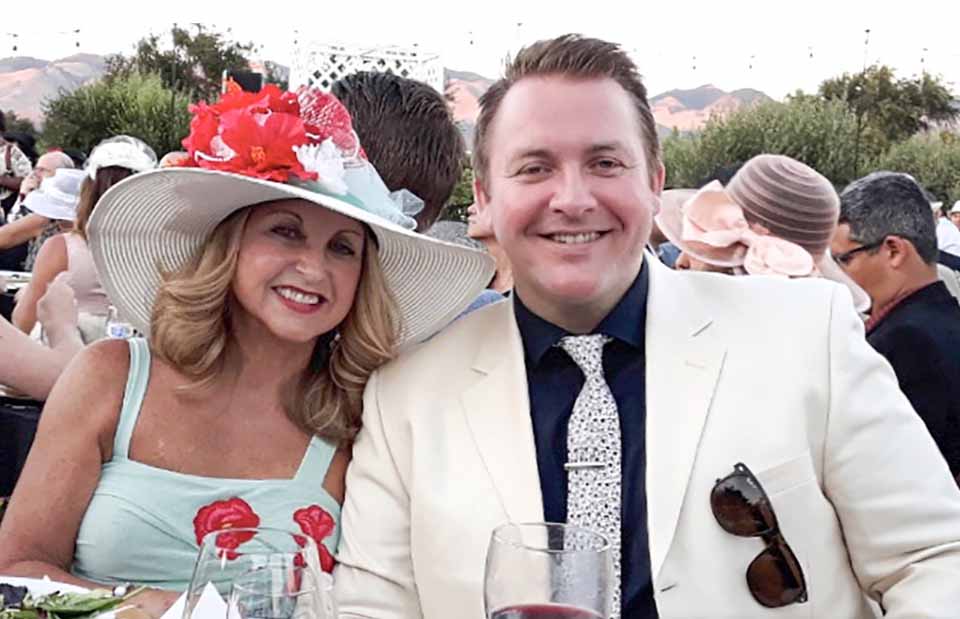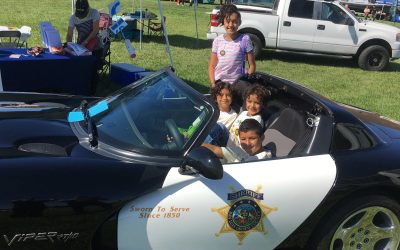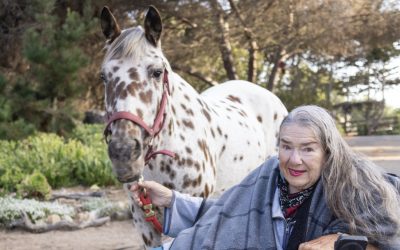“…And justice for all.” Since first grade, Americans have pledged their allegiance to a country that makes that promise. Yet, as our history and current evidence show, justice is not always meted out fairly, and all too often, not at all. In a news cycle dominated by the newest victims of injustice, it is heartening to know there are people fighting for them—people who make it their life’s work to bring justice to those who cannot fight for themselves. Such people deserve to be recognized, and the San Luis Obispo Legal Assistance Foundation (SLOLAF) agrees. Every year, one local person is selected to receive the Access to Justice Advocate Award, and this year, at a gala fundraiser held last month, Jacqueline Frederick was the honoree.
Founded in 1992, SLOLAF itself deserves recognition for striving to bring justice to our most vulnerable county residents. Through programs like the Senior Legal Services Project, the Family Law Advice Clinic, and the Vets Assistance Program, seniors, families, and veterans can get a full range of services—from legal advice and consultation to full representation—free of charge. But, as SLOLAF Legal Director Stephanie Barclay says, “We cannot do it alone.”
To deliver its services, SLOLAF relies on grants received from various state and local entities, partnerships with Stand Strong and CAPSLO, fundraisers, and significantly, members of the legal community like Jacqueline Frederick.
Founded in 1992, SLOLAF itself deserves recognition for striving to bring justice to our most vulnerable county residents. Through programs like the Senior Legal Services Project, the Family Law Advice Clinic, and the Vets Assistance Program, seniors, families, and veterans can get a full range of services—from legal advice and consultation to full representation—free of charge. But, as SLOLAF Legal Director Stephanie Barclay says, “We cannot do it alone.”
To deliver its services, SLOLAF relies on grants received from various state and local entities, partnerships with Stand Strong and CAPSLO, fundraisers, and significantly, members of the legal community like Jacqueline Frederick.
“Jacque has always supported SLOLAF,” said Barclay. “She believes in our mission and sees first-hand how important our work is. She knows we can’t do it alone and she’s always there for us.”
Famously generous with her time, her legal expertise, and her financial support, Frederick takes on pro bono cases often, volunteers the resources of her law firm and personnel, and opens her home for fundraising events—all in the service of bringing justice to the underserved. She’s been practicing law since she passed the Bar in 1980, handling cases in the fields of personal injury, wrongful death, sexual assault, domestic violence, product liability, and agriculture law, to name only a few.
In her acceptance speech, Frederick spoke of the pro bono cases she’s tried this year alone—one to help an elderly woman who’d been tricked into giving her home away; another to help a woman who had been so emotionally and physically beaten down that she turned over all her money to the perpetrator; still another to help a parishioner who’d been bilked out of more than a million dollars by an out-of-area church. “It has been my honor and privilege to use my education and resources,” she said, “… to help those who do not have the financial or mental capacity to stand up to injustice.”
Born as Jacqueline del Valle Vitti to immigrant parents in New York City, Frederick soon moved to Los Angeles where she attended Immaculate Heart High School and became its valedictorian. Her mother came here from Colombia to escape extreme poverty and domestic violence. Her father is from Western Europe.
Famously generous with her time, her legal expertise, and her financial support, Frederick takes on pro bono cases often, volunteers the resources of her law firm and personnel, and opens her home for fundraising events—all in the service of bringing justice to the underserved. She’s been practicing law since she passed the Bar in 1980, handling cases in the fields of personal injury, wrongful death, sexual assault, domestic violence, product liability, and agriculture law, to name only a few.
In her acceptance speech, Frederick spoke of the pro bono cases she’s tried this year alone—one to help an elderly woman who’d been tricked into giving her home away; another to help a woman who had been so emotionally and physically beaten down that she turned over all her money to the perpetrator; still another to help a parishioner who’d been bilked out of more than a million dollars by an out-of-area church. “It has been my honor and privilege to use my education and resources,” she said, “… to help those who do not have the financial or mental capacity to stand up to injustice.”
Born as Jacqueline del Valle Vitti to immigrant parents in New York City, Frederick soon moved to Los Angeles where she attended Immaculate Heart High School and became its valedictorian. Her mother came here from Colombia to escape extreme poverty and domestic violence. Her father is from Western Europe.
While working three jobs to support herself, Frederick attended California State University at Northridge. From there, she moved on to law school at the San Fernando Valley College of Law/University of La Verne where she graduated in the top ten percent of her class. Upon obtaining her J.D., Frederick joined the California bar and began work as an associate at a prominent Santa Monica trial law firm. Four years later, she founded her own firm in Los Angeles, concentrating on serious bodily injury cases and civil litigation.
She moved her firm to San Luis Obispo County in 1990, where she now serves clients in the counties of San Luis Obispo and Santa Barbara.
A glance at the long list of notable cases will tell you that most of her practice is spent advocating for victims—people who were gravely injured or killed by negligent oil companies, faulty appliances, vicious dogs, or sexual predators.
She has also taken up the cause of the Hispanic immigrant through her leadership with the Latino Outreach Council. “Little did I know six years ago that this cause would be ever more prescient and vital to address today,” she said. “People need to understand how important it is that we support our immigrant farmworkers … how vital they are to the entire agricultural industry, not to mention other industries.”
Every year, Frederick offers up her home and shares her amazing paella recipe for a gala dinner that is auctioned off and enjoyed by the lucky winners. All the proceeds go to support SLOLAF.
In a career that now spans nearly 40 years, the list of awards, board memberships, articles, and achievements to her credit would make even the most tireless over-achievers go weak in the knees.
“I really care about my clients,” she said. “I understand that they are going through what for them is often the most traumatic event in their lives, so I put them first. It’s about helping in the most compassionate way I can … to do what’s right.”
But Frederick says her proudest achievement by far is the raising of her three sons— Christopher, Michael, and William with her husband Gary Frederick. Two of them are physicians, and one is a lawyer, and they’ve all “inherited” their mother’s penchant for giving back.
She moved her firm to San Luis Obispo County in 1990, where she now serves clients in the counties of San Luis Obispo and Santa Barbara.
A glance at the long list of notable cases will tell you that most of her practice is spent advocating for victims—people who were gravely injured or killed by negligent oil companies, faulty appliances, vicious dogs, or sexual predators.
She has also taken up the cause of the Hispanic immigrant through her leadership with the Latino Outreach Council. “Little did I know six years ago that this cause would be ever more prescient and vital to address today,” she said. “People need to understand how important it is that we support our immigrant farmworkers … how vital they are to the entire agricultural industry, not to mention other industries.”
Every year, Frederick offers up her home and shares her amazing paella recipe for a gala dinner that is auctioned off and enjoyed by the lucky winners. All the proceeds go to support SLOLAF.
In a career that now spans nearly 40 years, the list of awards, board memberships, articles, and achievements to her credit would make even the most tireless over-achievers go weak in the knees.
“I really care about my clients,” she said. “I understand that they are going through what for them is often the most traumatic event in their lives, so I put them first. It’s about helping in the most compassionate way I can … to do what’s right.”
But Frederick says her proudest achievement by far is the raising of her three sons— Christopher, Michael, and William with her husband Gary Frederick. Two of them are physicians, and one is a lawyer, and they’ve all “inherited” their mother’s penchant for giving back.
Balance, she says, is a key to managing it all. Toward that end, Frederick says she practices yoga daily, and takes tango lessons once a week. In fact, you’ll find her at The Madonna Inn most Sunday evenings, happily putting her lessons to the test. Surprised and humbled by the award she won last month, Frederick opened her short and impassioned acceptance speech by quoting the Irish statesman, Edmund Burke, who said “The only thing necessary for the triumph of evil is for good people to do nothing.”
Jacqueline Frederick has her own version of that quote. Repeatedly warned by colleagues and friends that she takes on too many cases and causes, she replied, “To that I say … I cannot not do it.”
Jacqueline Frederick has her own version of that quote. Repeatedly warned by colleagues and friends that she takes on too many cases and causes, she replied, “To that I say … I cannot not do it.”





